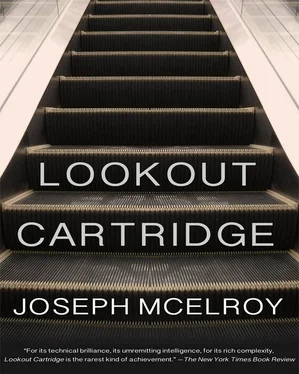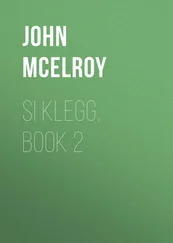Joseph McElroy - Lookout Cartridge
Здесь есть возможность читать онлайн «Joseph McElroy - Lookout Cartridge» весь текст электронной книги совершенно бесплатно (целиком полную версию без сокращений). В некоторых случаях можно слушать аудио, скачать через торрент в формате fb2 и присутствует краткое содержание. Год выпуска: 2014, ISBN: 2014, Издательство: Dzanc Books, Жанр: Современная проза, на английском языке. Описание произведения, (предисловие) а так же отзывы посетителей доступны на портале библиотеки ЛибКат.
- Название:Lookout Cartridge
- Автор:
- Издательство:Dzanc Books
- Жанр:
- Год:2014
- ISBN:9781941088036
- Рейтинг книги:3 / 5. Голосов: 1
-
Избранное:Добавить в избранное
- Отзывы:
-
Ваша оценка:
- 60
- 1
- 2
- 3
- 4
- 5
Lookout Cartridge: краткое содержание, описание и аннотация
Предлагаем к чтению аннотацию, описание, краткое содержание или предисловие (зависит от того, что написал сам автор книги «Lookout Cartridge»). Если вы не нашли необходимую информацию о книге — напишите в комментариях, мы постараемся отыскать её.
Lookout Cartridge — читать онлайн бесплатно полную книгу (весь текст) целиком
Ниже представлен текст книги, разбитый по страницам. Система сохранения места последней прочитанной страницы, позволяет с удобством читать онлайн бесплатно книгу «Lookout Cartridge», без необходимости каждый раз заново искать на чём Вы остановились. Поставьте закладку, и сможете в любой момент перейти на страницу, на которой закончили чтение.
Интервал:
Закладка:
Oh Andsworth calls film evanescent.
But he wasn’t on your film?
He isn’t on it, no.
You say isn’t! How much is there, then? More than you said?
There’s so much a film can’t find. It catches the dull gleam and choppy chill of the sea when the dilettante geologist was bringing Jim Nielsen into a Hebridean cove; but not the sea’s curve over the horizon, for you have to reflect upon that, formulate it, imagine it. The film catches the look of Paul’s shoulders so narrow they seem to have been framed in a vise which simultaneously heightens him. Film claims his shaggy moustache, frames the lanky hint of ungainliness when Paul stumbled and braced himself as Tessa tried to tug him through a portal toward the light. You could catch that on film, but not the posthumous alignment on the one hand of Paul’s widely suspect conversion from violence which he’d come to believe was not authenticity but the mere figment of change, and on the other hand ( his hand that’s being tugged!) Tessa’s long fling with Maya blood, and the heart-excision atop the priestly pyramid, and some half-chewed creed of cruelty whose roots plot their length through the other violence of a tame marriage which was in turn one yield of a wifeless father (seeking angrily, fearfully his wide-eyed daughter hiding in a bombed house) and of a mother crystallized into ash or bone-meal or, at best, thought. Catch even on a sound track as if from under a stone in response to the bank clerk’s account of how far some of Stonehenge had to come, these words: It comes to that, and that alone — Paul Flint’s words, as you who have me may have guessed.
But take the film in daylight or night light or from the air even if — action! — we restage the wheelless haul from Wales by neolithic land and water with bare brawn and animal hides and at the end on Salisbury Plain log stages for raising the lintels — and instead of a star in the lead a blond or swarthy tall unknown — think of all an emulsion, a lens, a drive motor, and a mind running the contraption can’t convey. There’s so much more.
I suppose you’ve seen your swashbuckling friend Dagger since he arrived, said Monty. If there’s more, did he bring it with him? Claire said all he sneaked in was a carton of audio gear he’s going to sell.
So much more: not only the idea of the sun cutting across the eyeball as if its vitreous arc were a gate giving a million alignments to that other energy the brain — oh not only the hot god or mere star or grid-fixed force passing from parallel to parallel across that useful fiction the celestial sphere (not parallel— declination , blinks Ned Noble from someplace in my system which is not only my system, for I have grown into the impingement of other fields on mine and this sense should in theory mean I’m in less danger than, say, Incremona, Jerry, or Claire) each day each year each 26,000-year cycle of the whole solar system. (Whole? Who says it’s whole? blinks a light which may be Ned at an outpost of my lung or may be just my thought of what he’d say.)
What is this danger Claire is in? asks Monty Graf fresh from England, continuing to smoke to keep his weight in hand, and now less clear what it is that he and his young beloved are trying to salvage for themselves.
But Monty old friend, having like you and Claire set too high and narrow a hope upon the film, I then let the contrary occur, let its scenes come between me and it, so what I valued was not the film at all but the fog at the edge of the bonfire ring, the fog becoming something else gassy to jump and bend (I told Claire) through the forms of a boy in overalls, a big woman in red and yellow swinging across the circle, her glad tantrum of head-wagging, two burning branches bearing a gray label — all that was left of a carton — not the label even but letters once on it like some instance of Hindu Māyā that lets us believe in the rest that may not really be there.
Then was it you who destroyed parts of the film or let people think parts were destroyed?
Instead of the film as all or nothing (which is dangerous) let us conceive something else: beyond the Druid’s circuitries with Yes or No gods at the gates of our bodily systems which in the idiom of computers become newly strange and finely limited and whole and, hence, beyond Jenny at Stonehenge stepping back inside the circle but facing out with her back to me taking a picture through a linteled arch then turning radiant to me as if she were my transit outward or my charged gate and calling to me (where I stood by the altar stone with the bank clerk behind me), It’s a message! — while he, rustling in his clear plastic mac coughed and the cough turned into hard facts about two circles (not one), sixteen Sarsen stones left out of thirty, exact measures of consistent distances from midstone to midstone—
Did you take your daughter to the Stonehenge filming? asks Monty, who fears me now and in a moment will ask the waiter first for another gin and milk, second for the Men’s Room, and go phone Claire instead.
No, instead of the film as all or nothing, which is dangerous, very dangerous, Monty — something else: something beyond the straight routes the globe’s arcs become when opened flat upon Mercator’s grid, something beyond the mere choice of flat to sphere or sphere to flat.
I happen to know, said Monty, that you and Dagger DiGorro do a little quiet trade in rare maps.
Beyond, to what Andsworth has hinted are new modes of mind that likewise will do violence in order to pan from state to state, but benign violence by which a mind that has become whole with the personal body it is part of can project force into other minds without the medium of plotted motion or verbal circuits, to live with others in a new privacy of collaborative process in which getting there or back here has become so minor as to be forgotten—
Monty is almost angry: Claire had nothing to do with the rare maps or the electronic equipment, and she does not know Andsworth. Do you recall when you introduced him to Dagger?
— and there won’t be Time in the old sense of resistance that impedes what in some old sense of Space is unresisted or unlimited, and hence there will be no motion in the old formula synthesizing the two—
One hears that in Andsworth’s macrobiotic community there is an American girl quite hung up on him. Why do you speak of danger to Claire? From what John said to me in Coventry, your daughter Jenny is the one who is in danger.
— which I only now see may yield, through the old man’s prophecy and then my intervention, a formula for those still more distant futures loosed in 1945 by the bitter shrug of an adult who seemed in that corridor of Brooklyn Hospital to be neither breathing nor holding his breath, Hy Noble, with the olive pallor left like some helpless health below his tan from a month at the Jersey shore. I had come from Ned’s private room where Hy’s young-looking wife (if she was now jumping up to crank Ned’s bed) sat with her horn-rimmed glasses in her lap across an open book. I came out into the corridor, and my future like Lorna’s at fourteen when she asked an intern in the middle of the night if her father would live would hinge on the question I now asked Ned’s father: Is there any chance Ned was kidding about the crystal set and the plan for the time machine?
Mr. Noble’s shrug holds very still now, as I look out across two empty glasses at Monty Graf — the shrug so still that the shoulders and their anguish sink into a negative to which the son Ned undying might well have conceived an entry that would interest if not ravish old Babbage with his skeleton key (given to the world as naturally as Bob Harte lent away the key to Trotsky’s gate or, Monty, you gave Paul Flint a key to your house in King Street), and behind Babbage, Lord Napier the inventor of logs, with his early computer, bits of wood or ivory, Napier’s Bones.
Читать дальшеИнтервал:
Закладка:
Похожие книги на «Lookout Cartridge»
Представляем Вашему вниманию похожие книги на «Lookout Cartridge» списком для выбора. Мы отобрали схожую по названию и смыслу литературу в надежде предоставить читателям больше вариантов отыскать новые, интересные, ещё непрочитанные произведения.
Обсуждение, отзывы о книге «Lookout Cartridge» и просто собственные мнения читателей. Оставьте ваши комментарии, напишите, что Вы думаете о произведении, его смысле или главных героях. Укажите что конкретно понравилось, а что нет, и почему Вы так считаете.












